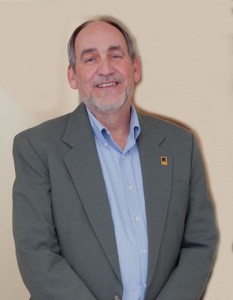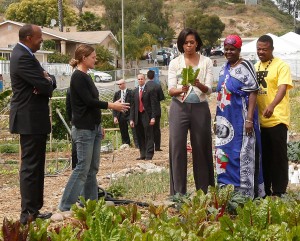By WardheerNews
Editor’s note: March 2, 2015 marks the day that a good friend of WardheerNews, Mr. Bob Montgomery, the Executive Director of the IRC in San Diego retires, after 38 years of service and dedication. Mr. Bob shared on these pages, many insights on refugee issues, dissecting the gamut from coming to America to the daily challenges and opportunities of a refugee. WardheerNews wanted to mark the occasion with an extensive interview with Mr. Montgomery. Although Bob’s experience and service to the refugee community in San Diego is not limited to the interview, we thought, it was a great way to dip into the mind of a man who has dedicated his professional life to lending a helping hand to refugees, particularly his wide knowledge of the Somali culture has always been helpful to new comers. Abdelkarim A. Hassan conducted this interview for WDN.
———–
WardheerNews (WDN): Mr. Montgomery, we are delighted to welcome you to WardheerNews.com before we delve into the bulk of the interview, could you please share with us a brief background history about yourself?

Bob Montgomery: Thank you for this opportunity to share with your readers my experiences in working for refugees in my 38 year career with the International Rescue Committee (IRC). I came into refugee work for two main reasons. First at the same time I was graduating from San Diego State University (SDSU) with a BA in Social Welfare Saigon fell to the communists in May of 1975. Soon after Saigon fell the US Government airlifted more than 140,000 refugees to the United States with approximately 30,000 arriving to Camp Pendleton. Second I had served in the US Army in Vietnam and because of that experience I decided to volunteer with the IRC and assist the Vietnamese refugees that were being temporarily house at Pendleton.
After about six weeks of volunteering I left California to go the Temple University in Philadelphia to obtain my Master’s Degree in Social Work (MSW). Upon graduation in May of 1976 I was contacted by my former SDSU classmate, who founded the IRC office in San Diego and she offered me a job. Originally the job was only to be for the summer but it turned into a long term career is helping refugees.
WDN: IRC was established during the WWII with the mission to assist and support refugees fleeing the Nazis in Germany, as well as to provide emergency relief to the victims of the war. There were also resettlement programs for East Europeans who have lost their loved ones and their lives to the Nazis. At the time, the victims were mostly Jews who were targeted for their ethnicity. How the IRC of that era in the 40s is different from today’s IRC in terms of people served by the IRC?
Bob: It is true that when it was founded the IRC focused mainly on European refugees fleeing persecution by the Nazis. The majority of the refugees at that time were Jewish. In later years the IRC assisted other refugee groups that were fleeing Communist oppression including: Hungarians in 1956, Cubans in the 1960s and Czechs after Prague Spring in 1968.
Then in the spring of 1975 the IRC responded to the plight of more than 140,000 Southeast Asian refugees, mostly Vietnamese who were fleeing the invasion by the Communist regime from North Vietnam. This started a new era for refugee resettlement. It was also at this time when I joined the IRC in 1976.
At that time resettlement could be characterized as an emergency response program. The IRC and other resettlement agencies would expand to meet the immediate needs of the current crisis and just as quickly contract after the emergency was addressed. However, this emergency continued on for many years and the U.S. Government (USG) realized that a more institutionalized response was require to meet the needs of the growing flow of refugees from SE Asia. The USG response was the passing of the 1980 Refugee Act.
With the passing of the Act we began to see a growing diversity in the refugees that the IRC resettled including refugees from: Eastern Europe, Africa, South Asia and the Former Soviet Union. With this diversity came other resettlement challenges. Many refugees arrived with fewer transferrable job skills than their predecessors, poor education and limited English ability.
Thus IRC’s response was to develop a broader array of services and look to serve refugees for a longer period of time. Further because resettlement was no longer deemed merely a short-term emergency response we now develop programs that serve the needs of the newly arriving refugees but also of other community members as well. We also look for ways to invest in the communities we work in, hence the development of programs like urban agriculture, microenterprise and other economic development activities. By doing this IRC is able to facilitate the integration of refugees as well as to temper the impact that resettlement can have on a community.

So in summary the IRC today has built on our humanitarian history and we now serve a diverse caseload through a broad array of programs that are open to refugees and non-refugees alike.
WDN: Although the core programs of IRC still focuses on refugees, mainly resettlement, there are however, as you noted a plethora of other programs designed to help the refugees to become financially independent, such as the micro-financing. So, who is eligible for the micro-financing programs and can you share with us a success story or stories of such micro-enterprise program (s)?
Bob: Because the majority of our microenterprise financial support comes from refugee specific funding from the Office of Refugee Resettlement (ORR) we mainly serve our refugee clients in the program. In recent years we have successfully diversified our funding for the program so we can serve some non-refugee clients as well, especially non-refugee women.
Since the program’s inception in late 2000 we have assisted more than 250 refugee owned businesses to get started. Further we have also strengthened another 250 refugee owned businesses by providing them with business technical support in: marketing, website design and developing sound financial management practices.
One recent success was a refugee man from Iraq. First through our Career Development Program we assisted him to obtain his commercial truck driver’s license. Then through an IRC microenterprise loan he was able to purchase his first truck. Since then he has purchased several additional trucks and expanded his business. He currently has eight trucks and employs 20 people.
Another major success of our microenterprise program is assisting refugee woman, including many Somali women, to get licensed and launch their own in-home childcare businesses. In many instances the IRC provided small loans to help them start their business. We have enjoyed other small business successes in the food and transportation industries.
Read more: WardheerNews Interview with Bob Montgomery of the IRC
WardheerNews
Email: [email protected]
We welcome the submission of all articles for possible publication on WardheerNews.com. WardheerNews will only consider articles sent exclusively. Please email your article today . Opinions expressed in this article are those of the author and do not necessarily reflect the views of WardheerNews.
WardheerNew’s tolerance platform is engaging with diversity of opinion, political ideology and self-expression. Tolerance is a necessary ingredient for creativity and civility.Tolerance fuels tenacity and audacity.
WardheerNews waxay tixgelin gaara siinaysaa maqaaladaha sida gaarka ah loogu soo diro ee aan lagu daabicin goobo kale. Maqaalkani wuxuu ka turjumayaa aragtida Qoraaga loomana fasiran karo tan WardheerNews.
Copyright © 2024 WardheerNews, All rights reserved


